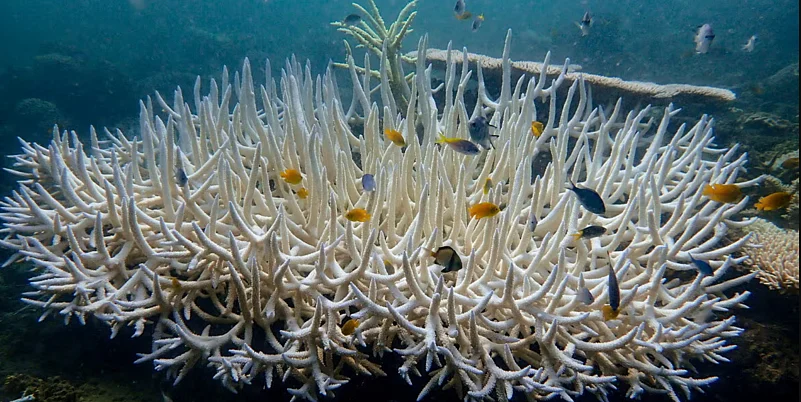In a concerning announcement on Monday, two leading scientific bodies, the National Oceanic and Atmospheric Administration (NOAA) and The International Coral Reef Initiative (ICRI), revealed that coral reefs worldwide are currently undergoing a significant mass bleaching event. This alarming phenomenon is primarily attributed to the escalating effects of the climate crisis, resulting in unprecedented ocean heat levels.
According to the joint statement issued by NOAA and ICRI, over 54% of coral reef areas across the globe have endured bleaching within the past year. This detrimental occurrence has affected at least 53 countries and territories, encompassing vast expanses of the Atlantic, Pacific, and Indian Oceans.
Derek Manzello, the coordinator for NOAA's Coral Reef Watch program, expressed grave concerns, stating, "It is likely that this event will surpass the previous peak of 56.1% soon." He further highlighted the distressing trend of increasing reef areas experiencing bleaching-level heat stress, escalating at a rate of approximately 1% per week.
Bleaching, a consequence of stress induced by marine heatwaves, leads corals to expel the algae residing within their tissues, which not only provides them with color but also a significant portion of their energy. Without a return to normal ocean temperatures, bleaching can result in widespread coral mortality, posing a severe threat to the species and the intricate food chains reliant upon them.
This marks the fourth global bleaching event in history and the second in the past decade, following occurrences in 1998, 2010, and the period between 2014-2017. Over the past year, regions such as Florida, the wider Caribbean, Mexico, Brazil, Australia, the South Pacific, the Red Sea, the Persian Gulf, Indonesia, and the Indian Ocean, including the east coast of Africa and the Seychelles, have confirmed mass bleaching.
Professor Ove Hoegh-Guldberg, a prominent climate scientist specializing in coral reefs at the University of Queensland, Australia, had foreseen this mass bleaching event months ago. "We knew sea temperatures were increasing rapidly, but not at this speed," he remarked, expressing concerns over the duration of the substantial temperature rise.
The past 12 months have marked the warmest globally recorded, with ocean temperatures surging to unprecedented levels. February and March witnessed record-high global sea surface temperatures, as reported by the European Commission's Copernicus Climate Change Service.
In response to the looming crisis, NOAA introduced three new alert levels to the coral bleaching alert maps in February, aiming to facilitate scientists in assessing the severity of underwater warming.
While the El Niño climate pattern has contributed to the surge in ocean heat, NOAA predicts the potential arrival of La Niña between June and August, offering a glimmer of hope for coral reefs. However, Manzello cautioned that bleaching events have persisted during La Niña in recent years, raising concerns for the upcoming summer, particularly for the wider Caribbean and Florida.
Recent observations by CNN revealed extensive coral bleaching on Australia's Great Barrier Reef, the world's largest coral reef system. A mass bleaching event was officially confirmed last month after comprehensive aerial and underwater surveys conducted by the Australian Institute of Marine Science and the Great Barrier Reef Marine Park Authority.
Selina Stead, CEO of the Australian Institute of Marine Science, emphasized the urgent need for action, stating, "The increasing frequency and extremity of marine heatwaves driven by climate change are testing the tolerance levels of coral reefs." She underscored the critical role of reducing carbon emissions and implementing effective coral reef management at local and regional levels.
Echoing these sentiments, the UN Environment Programme has issued warnings that failure to curb emissions could lead to nearly 3 degrees Celsius of warming above pre-industrial levels by the end of the century. Scientists project that even at a 2-degree warming scenario, approximately 99% of the world's corals could perish.
Coral reefs not only serve as vital habitats for marine life but also play a crucial role in safeguarding coastal communities against flooding and erosion. Additionally, they provide livelihoods and sustenance for over a billion people globally.
David Ritter, CEO of Greenpeace Australia, emphasized the urgent need for action, attributing the existential threat faced by reefs to fossil fuel companies and governments supporting the industry. Urging immediate cessation of new fossil fuel initiatives, Ritter emphasized the dwindling time to avert irreversible climate catastrophe.


























